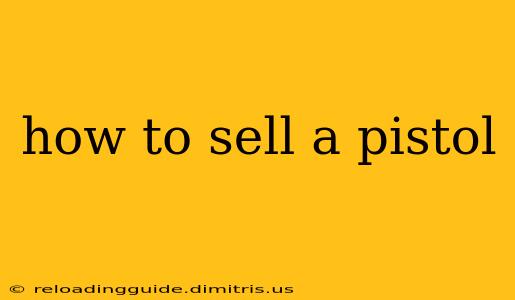Selling a pistol requires careful navigation of legal and safety protocols. This guide outlines the steps involved in selling a pistol legally and responsibly, ensuring both your safety and the safety of the buyer. We will cover everything from determining your state's laws to completing the transaction securely. Disclaimer: This information is for guidance only and does not constitute legal advice. Always consult with local law enforcement or a legal professional to ensure compliance with all applicable regulations.
Understanding the Legalities of Selling a Pistol
Before you even consider listing your pistol for sale, you must understand the laws governing firearm transfers in your state. These laws vary significantly and can include:
- Background checks: Most states require background checks for all firearm transfers, even private sales. Failure to comply can result in serious penalties.
- Registration: Some states mandate firearm registration, meaning you may need to report the sale to the authorities.
- Prohibited persons: There are categories of individuals legally prohibited from owning firearms, and selling a pistol to someone in this category is a crime. This includes felons, individuals with specific mental health conditions, and others.
- Waiting periods: Certain states have waiting periods between the sale and the transfer of the firearm.
Research your state's specific laws thoroughly. Your local police department or the Bureau of Alcohol, Tobacco, Firearms and Explosives (ATF) website are excellent resources.
Identifying Your Pistol and its Value
Accurately identifying your pistol is crucial for a successful sale. You'll need to know:
- Manufacturer: The brand name of the pistol.
- Model: The specific model of the pistol.
- Caliber: The ammunition size it uses.
- Serial number: This is essential for legal transfer documentation.
- Condition: Be honest about the pistol's condition – scratches, wear and tear, and any modifications.
Determining its value requires research. Check online marketplaces like GunBroker.com or GunsAmerica.com for comparable listings. Consider the pistol's condition, rarity, and accessories when setting a price.
The Safe and Legal Sale Process
Once you understand the legal requirements and have a fair price established, follow these steps for a secure transaction:
1. Advertising Your Pistol Responsibly
When advertising your pistol, be clear and concise. Include all relevant information (manufacturer, model, caliber, condition) and your asking price. Never disclose your personal address in the advertisement. Use reputable platforms and be wary of scams.
2. Meeting the Buyer Safely
Always meet the buyer in a public place during daylight hours, such as a licensed gun store or a police station. Never meet in a secluded or private location. Bring a friend or family member for added security.
3. Completing the Transaction
- Background Check: Ensure the buyer completes the necessary background check according to your state's laws. This might involve using a licensed firearms dealer, who can perform the background check and complete the paperwork.
- Documentation: Keep thorough records of the transaction, including the buyer's name, address (if required by law), date, and the pistol's serial number. This is vital for legal protection.
- Payment: Preferably accept a cashier's check or money order to avoid risks associated with cash or personal checks.
4. Safe Handling
During the entire process, handle the pistol responsibly. Keep it unloaded and in a case until the transfer is complete. Never point the firearm at anything you do not intend to shoot.
Conclusion: Responsible Gun Ownership
Selling a pistol responsibly involves understanding and adhering to the law, prioritizing safety, and maintaining proper documentation. By following these steps, you can ensure a smooth and legal transfer, protecting yourself and the buyer. Remember, always consult local law enforcement or a legal professional for specific guidance related to your jurisdiction.

